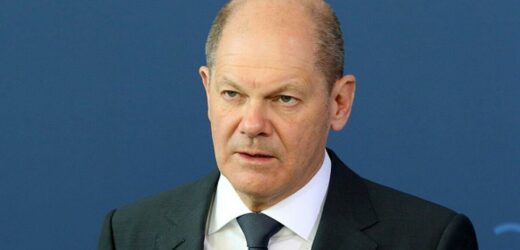Former Putin advisor slams Europe for using Russian oil on LBC
We use your sign-up to provide content in ways you’ve consented to and to improve our understanding of you. This may include adverts from us and 3rd parties based on our understanding. You can unsubscribe at any time. More info
Leading figures from several nations have come together to sign the letter addressed to Mr Scholz, who has been accused of hamstringing an effective response to Putin from the EU by opposing oil sanctions. The letter reads: “We find it hard to believe that the proud German nation, which strongly supports Ukraine and in huge majorities demands sanctions on Russia, is satisfied with such policy line of the German Government.”
It adds: “We understand that Germany may feel targeted by Putin’s threats to cut gas supply to your country if the EU oil embargo is introduced.
“However, Germany, and the EU, should not prove themselves vulnerable to Putin’s blackmail.”
Co-signatories of the letter include Lithuanian Prime Minister Andrius Kubilius, Spanish MEP and economist Luis Garicano, and Belgian MEP Guy Verhofstadt.
It continues: “Thus, we ask the German Government to take a stand on the right side of history; not to make an easy decision, but the right one.
“That is what the EU citizens, including our German fellows, expect from Germany, the country bearing natural responsibility to lead the community of European democracies in the face of the authoritarian aggressor.”


It comes as the EU prepares to introduce a new sanctions package which could be slapped down today.
Four diplomats told Politico that the package will include some form of ban on Russian oil imports.
But EU Foreign Policy chief Josep Borrell has said the bloc still come to an agreement.
He said: “At the moment, we in the EU do not have a unified position on this question.”
Mr Borell added that a “final proposal for an embargo on oil and gas is not yet on the table”.

Last week, Germany ruled out an immediate sanction on Russian oil last week, arguing that it needs time to prepare for such circumstances.
German Finance Minister Christian Lindner told the BBC: “We have to be patient.”
He added: “We are willing to stop all energy imports from Russia, it’s just a matter of time.”
But this is not good enough for MEPs, who have stressed the urgency of an immediate ban to stop Putin as he continues to unleash hell in Ukraine.
Particularly since the EU imported a staggering €48.5billion (£38billion) of crude oil in 2021, and €22.5billion (£19billion) of petroleum oils other than crude.
DON’T MISS
China’s ‘mighty dragon’ The terrifying weapons that Xi could hand P… [REPORT]
Nuclear survival advice issued as Putin threatens Ukraine [REVEAL]
Experts warn to stockpike SEAWEED to slash impact of Russian nuke [INSIGHT]

Earlier this month, MEPs voted overwhelmingly in favour of an immediate ban to all of Putin’s fossil fuel imports.
Mr Garicano launched a scathing attack on the European Commission, headed by Ursula von der Leyen, for delaying the ban.
He said in a speech in European Parliament: “President von der Leyen, a gas ban is possible. We aren’t even trying.
“If Europe does not stop funding Putin, history will not see us as bystanders. History will know we were complicit.”
“Our energy addiction, our money, allows the killing of Ukrainians, the killing of fellow Europeans whose only crime was to believe in our freedoms.

“Is it not clear that our gas is tainted with blood?”
And Berlin’s opposition appears to be one of the main reasons the EU is had been yet to issue an immediate ban, although the entire bloc does rely on Putin for 40 percent of its gas supply.
Germany is particularly dependent though, getting a third of its gas comes from Russia.
The country has repeatedly warned that an immediate ban would be catastrophic for the German economy, and now appears to be fearing that Putin could cut off its gas supply as a response to oil sanctions.
But Ukrainian President Volodymyr Zelensky has pleaded with Mr Scholz to think of the people of Ukraine and stop prioritising “economy, economy, economy”.
A Greenpeace study has warned that Germany’s payments of Russian oil could rise from €11.4billion (£9.5billion) to €14.3billion (£11.9billion) in 2022 compared to the previous year if a ban is not introduced.
It also warned that Germany’s gas payments to Russia could double, up from €8.8billion (£7.3billion) last year to €17.6billion.
Source: Read Full Article


